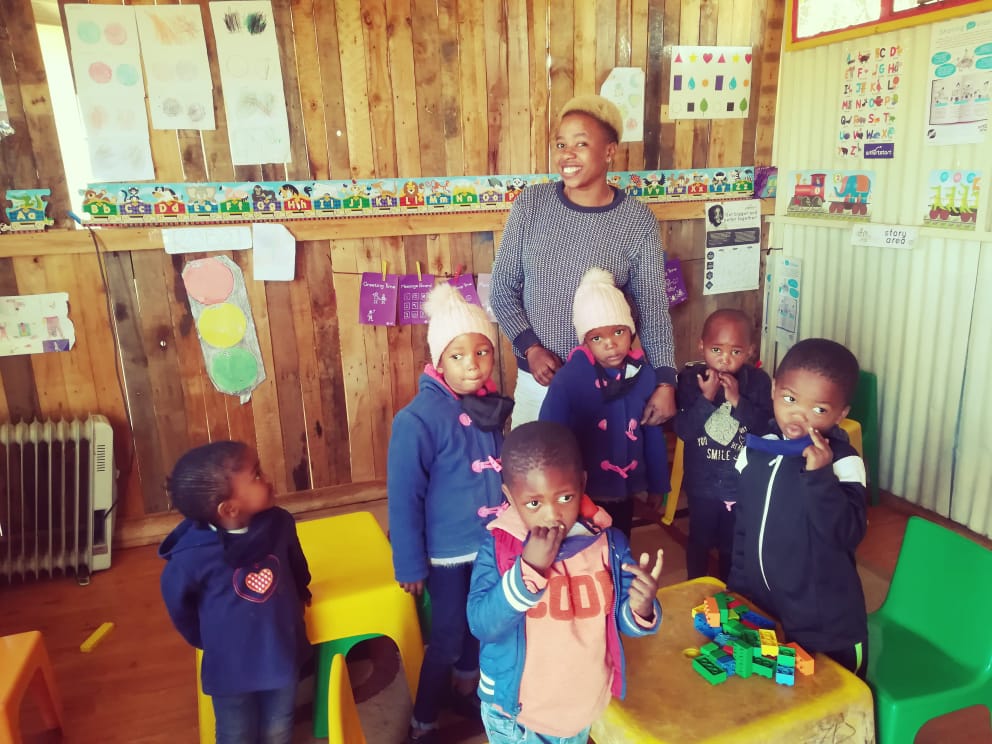Broadening Access to Early Learning Development for Poor Communities

Nosenzo Dladla is a 26-year-old women and sole provider for her family of five, including her two children and siblings. Her parents’ passing required her to fill their role in taking care of the family as no one else in the household was employed.
She joined SmartStart as a franchisee in 2019 and is one of the beneficiaries of the Jobs Fund-SmartStart Early Learning Franchisee Development project, which is a partnership between SmartStart and the Jobs Fund.
The National Treasury Jobs Fund-Smart Start project was approved in 2019 to broaden access to early learning for children in poor communities and create self-employment opportunities for women and youth in peri-urban and rural areas by establishing social micro-enterprises.
It provides training and business development support through coaches and club networks to enable beneficiaries to operate licensed early learning centres.
In addition, programme participants receive a stipend for 24 months. Dladla has received 20 payments to date and mentions that she would not have been able to operate her programme successfully without this support, which has further enabled her to support the community of Orange Farm, a township in the South of Johannesburg.
The SmartStart programme is accredited with the Education, Training and Development Practices Sector Education and Training Authority (ETDPSETA).
It will increase opportunities for the accreditation of ECD centres and further financial support from the Department of Social Development.
Dladla has always loved children, and her early childhood development (ECD) journey started in 2016 when she worked for various centres within the community. Wanting more for herself, she joined SmartStart. Over and above personal development, Dladla was drawn to SmartStart because she noticed that children in the programme were stimulated, engaged, and developed.
In contrast, only child-minding had been the focus in the centres where she previously worked.
At SmartStart, Dladla has found the support and business guidance provided extremely valuable.
She enjoys sharing her journey with her club members from Club Revelation, which gives her a sense of belonging and support.
“Before I joined SmartStart, I was very shy and not confident, but now I can approach my community members with confidence because I know I do a good job and trust my programme. Even the parents are happy with the development of their children,” she beams.
“Many of my parents mention how surprised they are that their children are able to do things they never thought they would do at their age. One of my children never used to talk to anyone and was shy; now she is confident and talks all the time,” Dlada adds.
COVID-19 negatively impacted the operations of these micro-enterprises, threatening the livelihoods of the franchisees and access to early learning for children in these poor communities.
The Jobs Fund approved an additional relief grant to enable the reopening and seamless operation of the centres while adhering to COVID-19 safety protocols.
Before the pandemic, Dladla saw growth in her SmartStart programme, with parents regularly requesting to enrol their children. She had 11 children registered in her centre;
however, the effects of the pandemic left many of her clients unemployed and unable to afford to pay fees. Remaining dedicated to the children’s development, Dlala has remained in contact with these parents and provided them with SmartStart home learning resources.
The pandemic has harmed the ECD sector, and SmartStart franchisees have chosen to remain open, restrictions allowing, for the children’s benefit.
Dlada charges R200 monthly per child but mentions that it is not enough to feed the children and purchase all the necessary cleaning material to keep her programme COVID-19 compliant.
“I don’t know what I would do if I weren’t getting the Jobs Fund COVID-19 Relief Grant. It helps me keep my centre open, and I don’t want to think about what will happen once it ends, and we are still in lockdown,” she fearfully highlights.
Dladla would love to see her programme grow and believes she is on the right track as she was able to stay in operation during such a difficult time, thanks to the support she received from the Jobs Fund. She has ambitions of growing her ECD centre and employing people within the community to work with her.
She sees this growth and expansion as her way of giving back and contributing to Orange Farm’s development through early learning.
Early childhood development is one of the most powerful investments in human capital that a government and society can make. Therefore, it is encouraging to see the investment in women entrepreneurship and quality learning aligning for the betterment of the community.